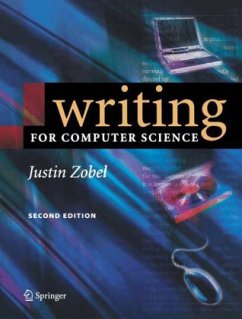The elements of good writing are an essential part of success in science. With comprehensive practical help for students and experienced researchers, Writing for Computer Science: - Gives extensive guidance for writing style and editing
- Presents sound practice for graphs, figures, and tables
- Guides the presentation of mathematics, algorithms and experiments
- Shows how to assemble research materials into a technical paper
- Offers guidelines and advice on spoken presentations. This second edition contains detailed new material on research methods, the how-to of being a scientist, including: - Development of ideas into research programs
-Design and evaluation of experiments
- How to search for, read, evaluate, and referee other research
- Research ethics and the qualities that separate good and bad science. Writing for Computer Science is not only an introduction to the doing and describing of research, but is a handy reference for working scientists in computing and mathematical sciences.
A complete update to a classic, respected resource
Invaluable reference, supplying a comprehensive overview on how to undertake and present research
- Presents sound practice for graphs, figures, and tables
- Guides the presentation of mathematics, algorithms and experiments
- Shows how to assemble research materials into a technical paper
- Offers guidelines and advice on spoken presentations. This second edition contains detailed new material on research methods, the how-to of being a scientist, including: - Development of ideas into research programs
-Design and evaluation of experiments
- How to search for, read, evaluate, and referee other research
- Research ethics and the qualities that separate good and bad science. Writing for Computer Science is not only an introduction to the doing and describing of research, but is a handy reference for working scientists in computing and mathematical sciences.
A complete update to a classic, respected resource
Invaluable reference, supplying a comprehensive overview on how to undertake and present research
From the reviews of the second edition:
"Zobel emphasizes that clarity ... . my review would read as follows: buy this book. ... The contents of the book are valuable, both as a reference ... . has tailored his book quite specifically to computer science researchers. He presents valuable examples drawn from computer science papers ... . This book is best suited to individual use. However, it could also serve as a supplementary text for a course on research methods. ..." (Max Hailperin, Computing Reviews, February, 2005)
"I decided to recommend Zobel's work to my advanced students and Ph.D. candidates. ... An extra goody are the twenty exercises. They constitute a good start into raising many of the issues treated in the book. Many chapters give check-lists or lists of good practice. ... His own way of writing demonstrates that there are helpful rules no writer should disobey. ... Good writing, even in computing science, remains a process of experience and dialectics. Zobel's book proves the point." (Frieder Nake, Zentralblatt MATH, Vol. 1106 (8), 2007)
"Zobel emphasizes that clarity ... . my review would read as follows: buy this book. ... The contents of the book are valuable, both as a reference ... . has tailored his book quite specifically to computer science researchers. He presents valuable examples drawn from computer science papers ... . This book is best suited to individual use. However, it could also serve as a supplementary text for a course on research methods. ..." (Max Hailperin, Computing Reviews, February, 2005)
"I decided to recommend Zobel's work to my advanced students and Ph.D. candidates. ... An extra goody are the twenty exercises. They constitute a good start into raising many of the issues treated in the book. Many chapters give check-lists or lists of good practice. ... His own way of writing demonstrates that there are helpful rules no writer should disobey. ... Good writing, even in computing science, remains a process of experience and dialectics. Zobel's book proves the point." (Frieder Nake, Zentralblatt MATH, Vol. 1106 (8), 2007)

